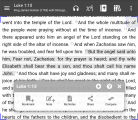| « Destroying the social network | VITA Royalties » |
Reporting 1099-MISC Income
When a client comes in for their tax preparation and presents you with a 1099-MISC, what is your response? Unless you are familiar with your client's activities, you should probably ask questions to determine how to handle it.
Three treatments
There are three basic ways to handle 1099-MISC. The back of the official 1099-MISC contains fine print that you can use to determine its treatment.
Probably the most common treatment is to report it on a Schedule C. If the client already has a business and this is related, that would be the way to go. Reporting it on Schedule C also means they must pay self-employment tax (15.3%). Half of it can be used as an adjustment to income, but it only reduces tax by the marginal rate. If there is no taxable income, the client ends up paying the entire amount. Always keep in mind that businesses will have expenses that can be reported on Schedule C. The transportation to and from the job, for example, may be deductible whereas they are considered commuting if it is a job.
An alternate treatment of 1099-MISC is possible if the income is temporary, sporadic, or a hobby. In that case, the income can be reported as Other Income. The back of the 1099-MISC explains that if you forget. There are two things different about this. First, as Other Income you do not have to report self-employment tax. Second, the income is not considered earned income and that will change deductions and credits based on earned income. Also, for hobby income business deductions are taken on Schedule A instead on Schedule C so you may not be able to use them.
A third treatment of 1099-MISC has to do with whether a person is an employee or a contractor. If you believe the client is an employee but received a 1099-MISC instead or a W-2, you may be able to report it as income on line 7 and file Form 8919. In this case, the income is earned income and the client only has to pay their half of Social Security and Medicare. You may also have to file a SS-8 explaining why the 1099-MISC is reported as W-2 earnings. Keep in mind that forcing an employer to treat your client as an employee could mean the employer will not need that employee in the future.
While the IRS probably will not complain if you report all 1099-MISC as business income and pay the highest self-employment tax, the reporting of a 1099-MISC should depend on the circumstances. You can't just look at what best benefits the taxpayer unless you can reasonably argue the case for that treatment.
Red Flags
One other consideration of treatment of 1099-MISCs is that the IRS will likely complain if you treat them differently from year to year. If it's Other Income one year and then Schedule C income the next, you could get a letter requesting self-employment of the first year's income. In fact, if the client has the same 1099-MISC two years in a row, it would be a good indicator that the activity is continuous and not sporadic. Some software incorporates this logic in their interview as a way to determine how to treat the income.
When you are reporting income as wages or other income, it's a good idea to retain a list of receipts that might be needed to amend the returns if the IRS says it is business income. An activity does not have to be full-time to be considered a business.
An unusual thing about whether or not an activity is treated as a business or a hobby is that losses are not deductible for hobbies. If you have been reporting that income as business income and the IRS says it is hobby income losses will be disallowed, but then that income is then not subject to self-employment taxes.
Note: This article refers primarily to Box 7 income. Other types of income are also reported on 1099-MISC and have separate treatment.

